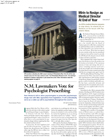Florida may continue requiring pharmaceutical companies to offer the state supplemental rebates in exchange for their products being included on Florida’s list of preferred Medicaid drugs, according to a December 28 ruling by the U.S. District Court in Northern Florida.
Under federal law, states are allowed to claim rebates on Medicaid prescription drugs from the manufacturers. In a survey conducted by the Kaiser Commission on Medicaid and the Uninsured in 2000, most states estimated that they recoup between 17 percent and 22 percent of Medicaid’s total outpatient prescription drug expenditures through manufacturers’ rebates.
The Florida legislature passed a law last May that authorized the creation of a list of preferred Medicaid prescription drugs that would include only those brands for which the manufacturers would grant rebates of an additional 10 percent. As a result of the rebates, the state expects to save at least $100 million this fiscal year, according to an article in the January 3 Wall Street Journal.
In addition, the law allows drug manufacturers to provide disease-management or health-education programs instead of offering the supplemental rebates, options that would produce savings of at least $16 million.
So far Pfizer and Bristol-Myers Squibb have opted to provide such programs. Pfizer instituted a disease-management program for chronically ill patients, and Bristol-Myers Squibb is developing a program for minority populations with depression, HIV, or certain cancers.
The Pharmaceutical Research and Manufacturers of America (PhRMA) filed suit in August in the U.S. District Court for Northern Florida alleging that the law violates a federal rule that all prescription drugs must be available to Medicaid recipients unless a drug offers no clinically meaningful benefit.
The court found that although the list steered doctors and their patients toward certain drugs, Florida did not prohibit access to drugs not on the list.
Doctors are able to request verbal authorization for an off-list drug from a phone bank of pharmacists and pharmacy technicians.
Wade Myers, M.D., president of the Florida Psychiatric Society (FPS), said, “We are all too familiar with ‘authorization obstacles’ that interfere with the provision of timely, quality patient care. Just how responsive can we expect this phone bank to be? Burdens for patients—like delays in receiving medication and increased costs—loom on the horizon in this arrangement.”
John Bailey, D.O., an FPS council member, expressed a similar view. “Given the advances in psychopharmacology we can offer our patients, third-party tinkering with rebates, formularies, and preferred-drug lists is ethically questionable. As physicians, the decision that we record on the prescription pad represents the most informed judgment for what is right for the patient. Anything else is second guessing.”
Jan Fails, assistant general counsel of PhRMA, said in a press release, “[T]he Florida statute clearly authorizes creation of a formulary and not simply a preferred drug list.” PhRMA plans to appeal the lower court ruling to the 11th Circuit Court of Appeals.
Florida’s action is one of number of state initiatives intended to address the rising cost of prescription drugs (Psychiatric News, January 18; February 1). On January 18 the Michigan Court of Appeals lifted a circuit court’s order that blocked the state health department from implementing its proposed drug formulary.
According to a front-page story in the New York Times on January 14, 2001, Idaho Governor Dirk Kempthorne (R) said, “Prescription drugs are rapidly becoming our single largest Medicaid expenses. Prescriptions are expected to cost 40 percent more this year than they did a year ago.”
The National Conference of State Legislatures (NCSL) found that as of October 2001, 26 states had passed some type of pharmaceutical regulation law. NCSL cites “a relatively new trend” in which bills seek to use Medicaid-style rebates, other discount rates, or current “lowest-available price” as a basis for a retail price, instead of providing a direct state-funded subsidy.
The Web site of the National Conference of State Legislatures is www.ncsl.org. ▪
